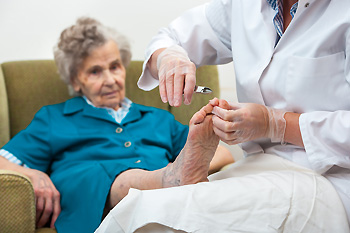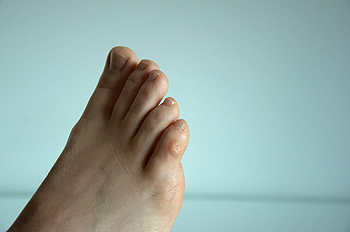
Foot problems are common in seniors, especially those over 75, and often impact mobility, independence, and quality of life. With age, the skin becomes thinner, circulation may decline, and nails can become thick or hard to manage. Other conditions, such as bunions, can cause persistent pain and make wearing shoes uncomfortable. Many older adults also experience swollen feet, diabetic foot ulcers, gout, and foot pain linked to arthritis or obesity. Many of these conditions are worsened by years of wearing poorly fitted shoes or underlying health issues like diabetes or vascular disease. Because these problems may develop gradually, they are often overlooked until they interfere with walking or balance. A podiatrist can evaluate your foot pain, deal with painful toenails, prescribe orthotics, and perform surgery when needed to relieve discomfort and restore function. If you are a senior experiencing foot pain, it is suggested that you schedule an appointment with a podiatrist for a diagnosis and appropriate treatment.
If you need your feet checked, contact one of our podiatrists of Central Ohio Comprehensive Foot Care. Our doctors will attend to all of your foot and ankle needs and provide you with quality treatment.
Geriatrics and Podiatry
When people age, some common issues that may occur are bone density loss, dry skin, poor circulation, and rough brittle nails. These issues may also affect your foot health if the necessary steps are not taken to alleviate the problems.
It is important to take care of your feet because feet that are injured or diseased can affect your overall health. Having painful feet hinders your ability to do daily activities or may decrease your willingness to do the things that you need to do.
Visiting Your Geriatrician
As we age, health problems become more likely, so it is essential to visit your doctor for check-ups to ensure that you are doing the best you can to take care of your health. It is recommended to check your feet frequently for any possible cuts, bruises, swelling, corns or any other irregularities.
Taking Care of Elderly Feet
Cracked or dry feet can be treated by applying moisturizer often. It is also important not to wear old socks because the older the sock is, the higher the possibility there will be that there is bacteria there. Wear fresh socks and make sure they fit properly.
Proper foot health means that you can have a more active lifestyle and you will not be bogged down by pain. Foot health also leads to good circulation, which is paramount for overall health.
If you have any questions, please feel free to contact one of our offices located in Delaware and Westerville, OH . We offer the newest diagnostic tools and technology to treat your foot and ankle needs.

Acute ankle sprains are a frequent injury in professional and non-professional baseball due to the high physical demands of the sport. These sprains often result from sudden movements such as sliding into bases, pivoting quickly, or landing awkwardly after a jump. The most common type involves the lateral ligaments on the outside of the ankle, but sprains can also affect the inner or high ankle ligaments. Players may experience pain, swelling, bruising, and instability. Diagnosis begins with a thorough physical examination to assess tenderness, range of motion, and joint stability. Imaging such as X-rays or MRI scans may be used to rule out fractures and evaluate ligament damage. If an ankle injury has occurred while playing baseball, it is suggested that you promptly consult a podiatrist who can accurately diagnose and offer effective treatment solutions.
Ankle and foot injuries are common among athletes and in many sports. They can be caused by several problems and may be potentially serious. If you are feeling pain or think you were injured in a sporting event or when exercising, consult with one of our podiatrists from Central Ohio Comprehensive Foot Care. Our doctors will assess your condition and provide you with quality foot and ankle treatment.
Common Injuries
The most common injuries that occur in sporting activities include:
- Achilles Tendonitis
- Achilles Tendon Rupture
- Ankle Sprains
- Broken Foot
- Plantar Fasciitis
- Stress Fractures
- Turf Toe
Symptoms
Symptoms vary depending upon the injury and in some cases, there may be no symptoms at all. However, in most cases, some form of symptom is experienced. Pain, aching, burning, bruising, tenderness, tightness or stiffness, sensation loss, difficulty moving, and swelling are the most common symptoms.
Treatment
Just as symptoms vary depending upon the injury, so do treatment options. A common treatment method is known as the RICE method. This method involves rest, applying ice, compression and elevating the afflicted foot or ankle. If the injury appears to be more serious, surgery might be required, such as arthroscopic or reconstructive surgery. Lastly, rehabilitation or therapy might be needed to gain full functionality in the afflicted area. Any discomfort experienced by an athlete must be evaluated by a licensed, reputable medical professional.
If you have any questions, please feel free to contact one of our offices located in Delaware and Westerville, OH . We offer the newest diagnostic and treatment technologies for all your foot care needs.

Corns are thickened areas of skin that usually develop on or between the toes as the result of constant pressure or friction. Corns on the toes or feet can make walking difficult and painful, especially when the affected area rubs against the inside of your shoe. A defining feature of a corn is its hardened core, which can press into the deeper layers of skin and cause sharp pain or tenderness that limits mobility. Symptoms may include dry, flaky skin, discomfort when wearing shoes, and raised, rough bumps that are painful to the touch. Poorly fitting footwear is a common cause of corns, especially styles that crowd the toes or create pressure points. A podiatrist can provide treatment to safely remove a corn as well as suggest prevention strategies. If you have foot pain that is caused by a corn, it is suggested that you schedule an appointment with a podiatrist for an exam and appropriate treatment.
Corns can make walking very painful and should be treated immediately. If you have questions regarding your feet and ankles, contact one of our podiatrists of Central Ohio Comprehensive Foot Care. Our doctors will treat your foot and ankle needs.
Corns: What Are They? And How Do You Get Rid of Them?
Corns are thickened areas on the skin that can become painful. They are caused by excessive pressure and friction on the skin. Corns press into the deeper layers of the skin and are usually round in shape.
Ways to Prevent Corns
There are many ways to get rid of painful corns such as:
- Wearing properly fitting shoes that have been measured by a professional
- Wearing shoes that are not sharply pointed or have high heels
- Wearing only shoes that offer support
Treating Corns
Although most corns slowly disappear when the friction or pressure stops, this isn’t always the case. Consult with your podiatrist to determine the best treatment option for your case of corns.
If you have any questions please feel free to contact one of our offices located in Delaware and Westerville, OH . We offer the newest diagnostic and treatment technologies for all your foot and ankle needs.

The running gait cycle is a complex sequence of movements that allows efficient forward motion. It consists of alternating phases of contact, propulsion, and flight, where both feet momentarily leave the ground. The feet play a vital role in absorbing impact, maintaining balance, and generating force. Strong foot muscles help stabilize each step, while proper alignment ensures smooth transitions between phases. Greater joint range of motion in the ankles and toes enhances flexibility and stride efficiency. The coordination of muscles in the legs and core supports overall movement, reducing the risk of injury. Maintaining proper running mechanics through strength training, flexibility exercises, and supportive footwear helps improve performance and prevent strain. Understanding how the feet function during running allows for better technique. If you have sustained a foot or ankle injury from running, it is suggested that you consult a podiatrist who can treat various foot conditions, and guide you on specific foot strengthening stretches.
If you have any concerns about your feet, contact one of our podiatrists from Central Ohio Comprehensive Foot Care. Our doctors can provide the care you need to keep you pain-free and on your feet.
Biomechanics in Podiatry
Podiatric biomechanics is a particular sector of specialty podiatry with licensed practitioners who are trained to diagnose and treat conditions affecting the foot, ankle and lower leg. Biomechanics deals with the forces that act against the body, causing an interference with the biological structures. It focuses on the movement of the ankle, the foot and the forces that interact with them.
A History of Biomechanics
- Biomechanics dates back to the BC era in Egypt where evidence of professional foot care has been recorded.
- In 1974, biomechanics gained a higher profile from the studies of Merton Root, who claimed that by changing or controlling the forces between the ankle and the foot, corrections or conditions could be implemented to gain strength and coordination in the area.
Modern technological improvements are based on past theories and therapeutic processes that provide a better understanding of podiatric concepts for biomechanics. Computers can provide accurate information about the forces and patterns of the feet and lower legs.
Understanding biomechanics of the feet can help improve and eliminate pain, stopping further stress to the foot.
If you have any questions please feel free to contact one of our offices located in Delaware and Westerville, OH . We offer the newest diagnostic and treatment technologies for all your foot and ankle needs.








